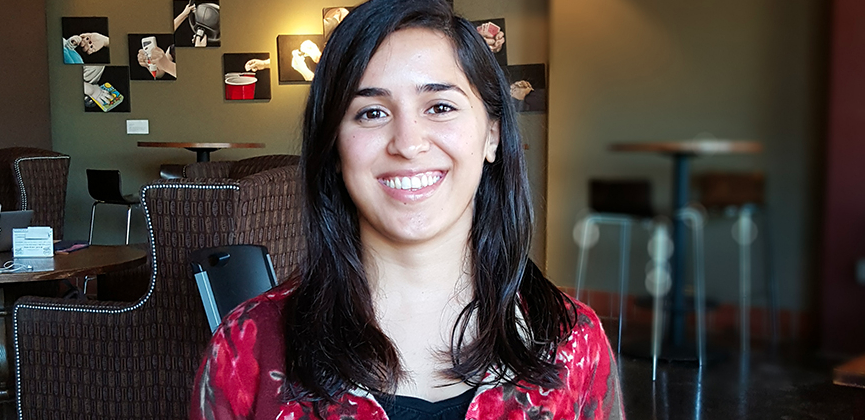 New math teacher and M.Ed. candidate Manju Connolly shares her experiences in the initial teaching license program and what she’s learned the first year on the job.
New math teacher and M.Ed. candidate Manju Connolly shares her experiences in the initial teaching license program and what she’s learned the first year on the job.
What drove you to enroll in the program?
I participated in the DirecTrack to Teaching program as an undergraduate, which allows students interested in teaching to take course and engage in service-learning teaching to fulfill prerequisites for the M.Ed and Initial Teaching License (ILP) program. I had two positive experiences with student-teaching placements in Minneapolis Public Schools. That, along with the reflective discussions we shared in the class solidified my interest in teaching. I also gained relationships with Minneapolis Public School teachers and mentorship from our DirecTrack teacher. Knowing that the M.Ed/ILP program would allow me to stay connected to these resources and maintain relationships I valued with other professors and peers, I decided to enroll.
Were there any surprises and challenges along the way?
Student teaching is challenging! It is one thing to practice making lesson plans and analyze the effectiveness of lesson plans through methodology classes, but it’s another thing to implement plans live with a group of students whose learning (and grade!) is directly affected by your performance. The experience has been terrifying, difficult, and thrilling. I was lucky to have two very supportive cooperating teachers, who provide me with clear expectations and ample feedback to help me improve my work.
What has been your experience with the faculty?
There are many faculty and staff that contribute to our cohort’s success, and I am especially grateful for our math education professors. Erin Baldinger always encourages us to think critically about how to maximize student learning. She also helped us be intentional about analyzing tasks and lesson plans for effectiveness. In terms of our claim to fame, it’s hard to find a math teacher in the Twin Cities (or maybe statewide…nationwide???) who doesn’t know about Terry Wyberg. His connections and positive reputation reach each aspect of our training, from getting us school observation opportunities to landing student teaching placements to networking with districts as we navigate the job search process.
How have you felt about the cohort model and experience?
I feel like we each had an important place in our class discussions, and would like to recreate the collaborative environment of sharing ideas, asking questions, and even arguing, that we experienced in the cohort model. As I have transitioned to being a teacher, having the cohort peers is invaluable for getting new ideas, sharing practices, and having an ear for when you just want to vent to someone else who cares as much about teaching as you do.
Has the student teaching helped you feel prepared to enter your own classroom?
I could not have been luckier with my placement. I had two cooperating teachers who were constantly seeking ways to connect the learning targets to the knowledge and experiences students bring. Our topics and projects were often motivated by videos, images, or students’ personal reflections. Most importantly, I got a chance to see how a collaborative group of teachers function within the math department; My teachers established early on that they would be direct with their feedback, and as a result I felt comfortable suggesting tasks or tweaks for our lesson plans because my ideas are valued, whether they are implemented by the team or rejected with justification.
What were your goals post-graduation? How did your first year live up to your expectations?
After graduating the licensure program in May, I finished up the semester at my student teaching placement and interviewed for high school math teacher positions. My goal had been to teach in the Twin Cities in an urban high school where I could support Spanish-speaking students and collaborate with an enthusiastic math department. I am very happy with the school I chose because it has a diverse student body, reminded me of my own high school in Chicago area, and has an immensely supportive math department team. We share resources, troubleshoot, and communicate weekly. This support has been the most valuable part of my new school, and I would be having a much tougher first year without it.
After this first year, I will recuperate, reflect on what worked and what did not, tweak or overhaul lesson plans for the upcoming year, and complete the final three classes of the M.Ed degree as I teach my second year.
Any other thoughts you want to share about your experience?
Teaching should not be an individual or isolated profession, and I know I need a lot of moral and professional support in my first few years. My teachers helped me apply for a fellowship, the Knowles Teacher Initiative, and I am thankful to count on that for continued support for my first five years and beyond. I am also thankful to reflect on my experience and have no regrets on choosing this program. I hope to maintain lifelong relationships with several faculty and cohort members because I believe it is an essential part of well-being. I plan on participating in local, state, and national math conferences to stay connected with them and motivated in the classroom.
Teaching will always be challenging, but I am ready to embrace the challenge and enjoy it because I now have a great group of people on my team.
Find out more about the M.Ed. and Initial Teaching License program in Mathematics Education.



